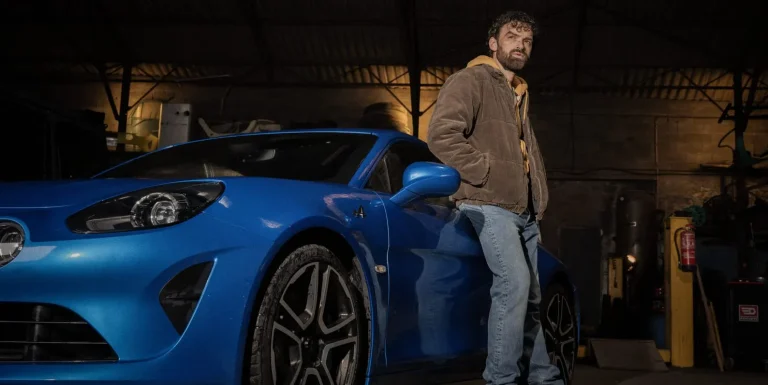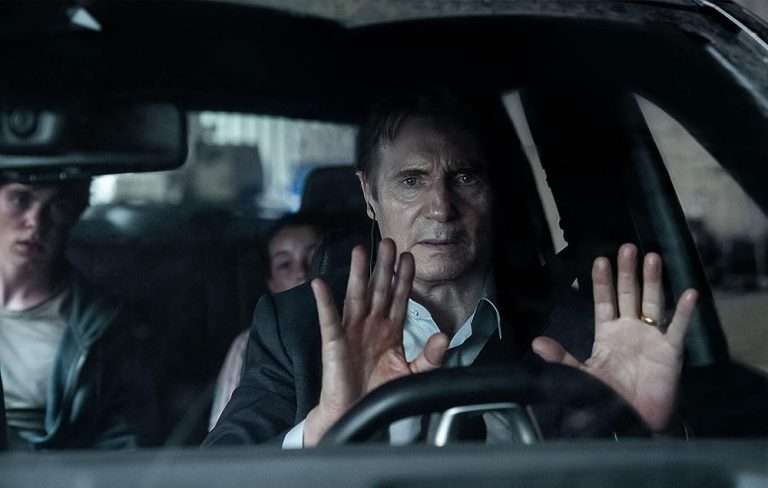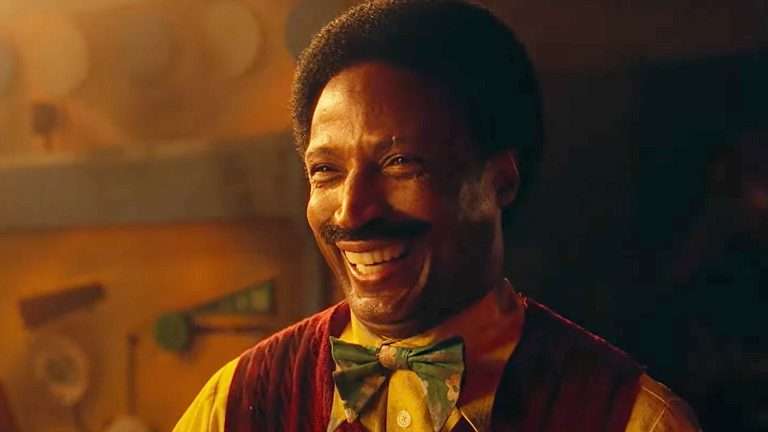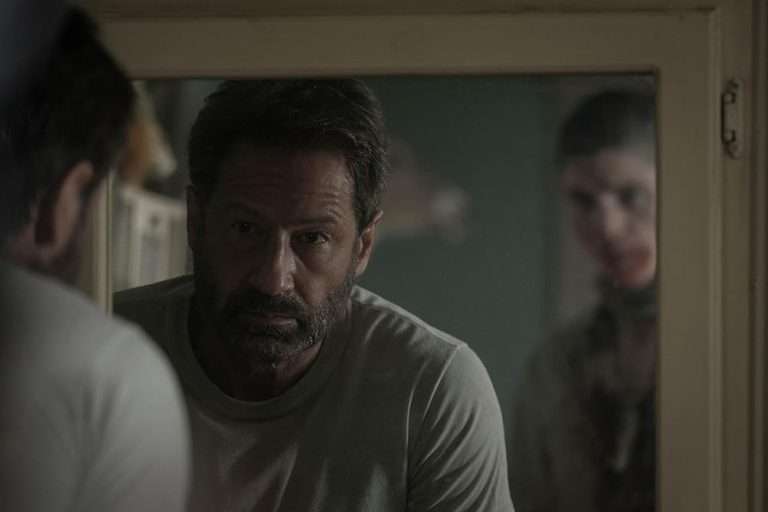Resurrection (2022) Movie Ending Explained & Themes Analyzed: Rebecca Hall is an underrated actor. But more than that, she is an underrated horror queen. Hall took on the role of Florence Cathcart for Nicky Murphy’s incredibly underappreciated gem of a film, The Awakening (2011). Set in 1921, she played a hoax exposer who went to a boarding school to examine ghost sightings. Although it’s not classified as a horror film, Joel Edgerton’s The Gift (2015) does check all the boxes of being one. As Robyn, she found herself in the middle of an unsettling reunion between his husband Simon (Jason Bateman) and Gordo (Edgerton).
She followed that up with the spine-chilling, The Night House (2021), directed by David Bruckner. In it, she played a widow named Beth who was dealing with the loss of her husband and that led to her being haunted by a faceless, shapeless entity. With Resurrection (2022), Hall shines a light on abusive relationships by wading into psychological warfare with Tim Roth.
Resurrection (2022) Movie Summary & Plot Synopsis:
Written and directed by Andrew Semans, the movie opens with a personal conversation between Margaret (Hall) and her employee Gwyn (Angela Wong Carbone). In which Gwyn is talking about liking some guy who occasionally makes jokes at her expense. Margaret asks her if she ever asked him to stop. Gwyn says she sort of did but this guy said that she’s being overly sensitive about these jokes. Margaret insists that this guy is merely exercising his sadistic tendencies on Gwyn and she should distance herself from him.
While leaving for the day, Gwyn requests her to keep this topic between themselves and Margaret promises to do so. Following that, we get to see that Margaret is wary of how clean her office is, she likes to be fit, and she has a casual, sexual relationship with Peter (Michael Esper), in which she prefers to be the dominating partner.
The next day, before preparing to go to the office, we see that Margaret shares an amicable relationship with her teenage daughter Abbie (Grace Kaufman). After returning, she tells Margaret that she’s going to go meet Lucy, her friend. Additionally, she reveals that she found someone’s tooth in her purse. While Abbie takes it in a joking fashion, Margaret hurriedly throws it in the trash.
Later that night, Abbie gets into an accident and Margaret’s carnal activities prevent her from getting to her daughter sooner. So, she proceeds to apologize profusely and Abbie is a little taken aback by it. The following day, Gwyn reveals she has broken up with her boyfriend because he wanted to “do something for him”. Margaret lauds her for that because it’s not an easy move. While attending a seminar, she notices David (Tim Roth), suffers an intense breakdown, and runs back to Abbie because she thinks that he has done something to her.
Resurrection (2022) Movie Themes Explained:
Abusive Relationships:
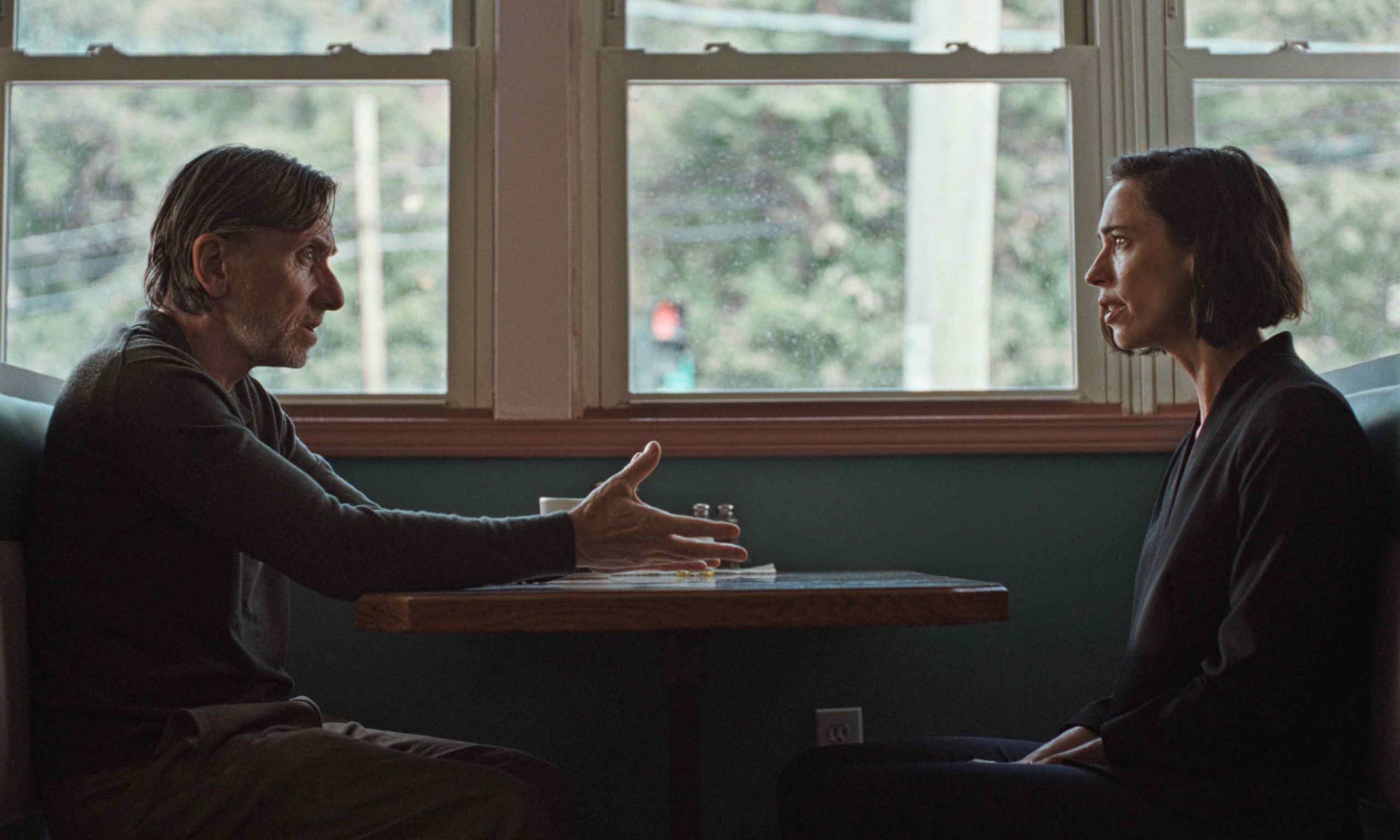
Going by Margaret’s first breakdown, it’s not instantly apparent how abusive Margaret’s relationship with David was. Heck, it’s not apparent if Margaret and David were even in a relationship. All we see is her seeing a dude in a seminar and freaking out. But during a dream sequence, we see her hearing someone knocking at her window, and then she notices something burning in her oven. It’s a baby.
During her first encounter (after 22 years) with David, we see how adept he is at gaslighting as he goes from not recognizing Margaret to saying that “Ben is with me” (their son) to name-dropping both her and Abbie. When Margaret calls him out for his lies, he instantly turns the tables by saying he didn’t even approach her. She did. She shook hands with him and introduced herself. While leaving, he grins wide enough to show that his tooth is missing; thereby hinting that he can get to Abbie whenever he wants.
Although Margaret keeps her past a mystery from Abbie, she spills it all to Gwyn in a riveting monologue. She says that her parents were biologists and after she turned 18, her parents took her to a research facility in the Queen Charlotte Islands. She used to draw a lot back then because she wanted to become an artist. That’s where they came across David, who made his way into the family and became acquainted with the three of them.
After a few weeks of that, she moved in with David and, initially, their relationship was romantic. But, soon after that, he started asking her to do things for him; which he called “kindnesses”. These ranged from cooking, cleaning, not drawing, not wearing shoes, etc. Then they turned into endurance tests, i.e. medication for hours, day-long fasts, and stress positions. In return, she’d get a lot of praise. During winter, she got pregnant and David forbade her from giving birth because he knew she wouldn’t prioritize him anymore.
So, David apparently ate the baby (named Benjamin by Margaret) to have Margaret all to himself. That was the breaking point for her and she ran to America, hoping that David won’t get to her anymore.
Power Dynamics:
Between David and Margaret, it’s obvious who is the dominant figure here. Everything from the apparent age gap to the lack of a guiding parental figure, a 40-year-old David towered over Margaret in every way possible. But it wasn’t enough for him in the past and it isn’t enough for him in the present; which is a tendency most men exhibit despite having all the privileges of being born into a male-dominated society.
The movie doesn’t really explain why David makes a return after 22 years. Maybe he has always been on the sidelines and he just couldn’t take it that Margaret has done a good job of bringing up Abbie. More than that, he has the audacity and the confidence that he still has a hold over Margaret after all these years. And something that’s scarier than that is seeing him do the same thing he did 22 years ago and watching it unfold like he wants it to.
That said, the damage that David has done goes far beyond the things that he does directly to Margaret. It’s apparent from, well, everything that Margaret does that she wants to feel all the time that she’s in control. In doing so, she ends up being a warped version of David. The first victim of this is Abbie. She is the easiest to control because she’s not an adult yet. So, by regulating where she goes, what she eats or drinks, who she meets, what she wears, and what she does, Margaret feels she’s on top of things.
The only difference is that Abbie doesn’t tolerate this. The second victim is Peter. Margaret’s relationship with him is non-commital because she doesn’t want to be associated with a man. But she needs someone, so she keeps him around and dominates and berates him. The third and final victim is Gwyn. By telling her to do the things she never did (or did it too late), Margaret feels she has some influence over Gwyn; thereby making her feel powerful.

Resurrection (2022) Movie Ending Explained:
While 90 percent of the movie is undeniably realistic in nature in terms of its portrayal of gaslighting in an abusive relationship, the ending takes a very bizarre turn. And then the epilogue hits you with a massive blast of ambiguity. So, let’s unpack it. Throughout the movie, Margaret has accused David of eating her son Benjamin and telling her that he lives inside him. He keeps telling her that Ben is suffering because Margaret abandoned him. At one point, he even manages to convince Margaret that she is hearing Ben’s cries.
To end her suffering, Margaret is left with no other option but to kill him. She can’t get him arrested because he’s stalking her like Max Cady (Robert De Niro) from the Cape Fear (1991), where he’s on the fence but not voluntarily in Margaret’s private space. Why can’t she kill him? Because, according to David, if Margaret kills him, Ben is going to die with him. Therefore, with Abbie gone, she’s left with no other option but to confront him.
Margaret leaves a note (explaining her relationship with David) for Abbie and a video message about how much she cherishes the time she got to share with her. And she goes to the hotel David is in. He begins his routine where he convinces Margaret that Ben is inside him. Going by her reactions, it seems like she’s falling for it. But then she says that Ben needs to be held and for that, David needs to cut out of the equation.
So, she pulls out the knives she had taped to her body before getting into the room and attacks him. After stabbing him in the gut and slicing his ankle, Margaret literally digs into his intestines and pulls out a very real baby. Then the movie cuts to the day Abbie is leaving, properly this time. She meets Margaret, who is holding Benjamin. Margaret tells her to hold the baby for a while. Abbie does and she thanks her for making everything alright again.
Then the shot cuts to Margaret and dolly-zooms into her. Her face is filled with happiness as she looks at Abbie holding Benjamin. But the closer the camera gets, the more concerned Margaret becomes, until she lets out a gasp. That’s where the movie ends. So, the most obvious explanation is that this is a figment of Margaret’s imagination.
There’s no way she pulled a baby out of David or got away with killing him (if she has in fact killed him). There’s no way that Abbie has come back, devoid of all the trauma Margaret inflicted upon her, and is properly bidding her mother goodbye.
Then what’s going on? Well, maybe Margaret’s consciousness has recessed to the deepest corner of her mind after her blood-curdling battle with David. Or, maybe, she has been sent to a mental hospital after her episode and that’s where she’s imagining all this. Either way, it looks like she’s beginning to realize what she has done. Hence, the shock.

